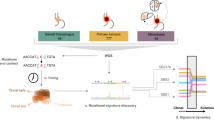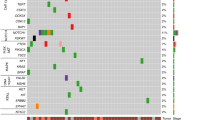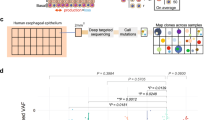Abstract
This study examined the association between 17p allelic loss, p53 gene mutation, p53 protein expression and DNA aneuploidy in a series of adenocarcinomas arising in the oesophagus and gastric cardia. 17p allelic loss was detected in 79% (15 of 19) of oesophageal and in 83% (29 of 35) of gastric adenocarcinomas. p53 mutations were detected in 70% (14 of 20) and 63% (26 of 41) of oesophageal and of gastric adenocarcinomas respectively. Both tumour types were associated with a predominance of base transitions at CpG dinucleotides. In five cases of oesophageal adenocarcinoma, the same mutation was detected both in tumour and in adjacent dysplastic Barrett's epithelium. Diffuse p53 protein expression was detected in 65% (13 of 20) and 59% (24 of 41) of oesophageal and of gastric tumours, respectively, and was associated with the presence of p53 missense mutation (Chi-squared, P < 0.0001). DNA aneuploidy was detected in 80% (16 of 20) of oesophageal and in 70% (28 of 40) of gastric tumours. No association was found between p53 or DNA content abnormalities and tumour stage or histological subtype. In conclusion, this study detected a similar pattern of p53 alterations in adenocarcinoma of the oesophagus and gastric cardia--molecular data consistent with the observation that these tumours demonstrate similar clinical and epidemiological features.
This is a preview of subscription content, access via your institution
Access options
Subscribe to this journal
Receive 24 print issues and online access
$259.00 per year
only $10.79 per issue
Buy this article
- Purchase on SpringerLink
- Instant access to the full article PDF.
USD 39.95
Prices may be subject to local taxes which are calculated during checkout
Similar content being viewed by others
Author information
Authors and Affiliations
Rights and permissions
About this article
Cite this article
Gleeson, C., Sloan, J., McManus, D. et al. Comparison of p53 and DNA content abnormalities in adenocarcinoma of the oesophagus and gastric cardia. Br J Cancer 77, 277–286 (1998). https://doi.org/10.1038/bjc.1998.44
Issue date:
DOI: https://doi.org/10.1038/bjc.1998.44
This article is cited by
-
Lifestyle chemical carcinogens associated with mutations in cell cycle regulatory genes increases the susceptibility to gastric cancer risk
Environmental Science and Pollution Research (2018)
-
Cigarette smoking, body mass index, gastro-esophageal reflux disease, and non-steroidal anti-inflammatory drug use and risk of subtypes of esophageal and gastric cancers by P53 overexpression
Cancer Causes & Control (2009)
-
Œsophage de Barrett, dysplasie, adénocarcinome: histomorphologie et apport de la biologie moléculaire
Acta Endoscopica (2008)
-
TP53 Gene Mutations Are Rare in Nondysplastic Barrett's Esophagus
Digestive Diseases and Sciences (2006)
-
Lack of prognostic impact of p53 gene mutation and p53 phosphorylation at serine 15 in multimodally treated adenocarcinomas of the gastroesophageal junction
Journal of Cancer Research and Clinical Oncology (2006)



